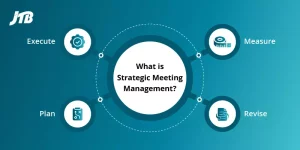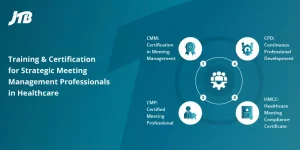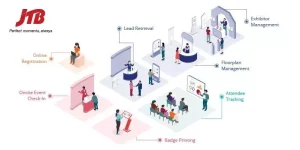Explore How Strategic Meetings Management in Healthcare Sector Works
In the ever-evolving landscape of the healthcare sector, where precision and collaboration are paramount, the role of strategic decision-making cannot be overstated.
As healthcare professionals navigate the complexities of patient care, research advancements, and industry regulations, the need for a systematic approach to meetings and conferences becomes increasingly apparent.
That’s where Strategic Meetings Management (SMM) in healthcare becomes a game-changing paradigm. It has emerged as a beacon of efficiency and effectiveness in the healthcare realm.
But do you know what exactly SMM is and how it can benefit you in the healthcare industry?
Let’s explore them here.
What is Strategic Meetings Management in Healthcare?
Strategic Meetings Management is a smart and organized way of handling meetings and conferences within a company.
It means standardized processes, tech-savvy solutions, and ongoing improvements tailored to your specific role. It’s not just about managing meetings; it’s about enhancing your impact within the organization. Whether you’re handling details, balancing budgets, or setting the strategic direction, SMM is your partner in ensuring each meeting contributes to the organization’s success.
But why is it important in the healthcare industry?
Importance of Strategic Meetings Management in Healthcare Organizations
Strategic meetings management in the healthcare sector is crucial due to its potential to bring about transformative improvements in various aspects of the industry. Here are key reasons why it is crucial:
- It helps professionals work together more effectively, improving communication for better patient care.
- In a budget-sensitive field, SMM ensures meetings are cost-effective, using resources wisely to meet organizational goals.
- It ensures that meetings follow regulations, reducing legal risks and keeping organizations within industry guidelines.
- It aligns meetings with the overall strategy, helping leaders make informed decisions that positively impact patient care.
- It adapts to changes in a dynamic sector, ensuring the meeting process stays relevant and effective.
- It organizes training sessions, conferences, and seminars, promoting ongoing learning for professionals.
In essence, SMM is more than just a process—it’s a strategic approach that enhances collaboration, efficiency, and patient outcomes.
But there are certain challenges that you can face in this industry.
Key Challenges
In the healthcare sector, effective communication and collaboration are crucial for success. However, organizations often face numerous challenges in this regard. To address these challenges and drive positive change, strategic meeting management plays a pivotal role.
1. Technology Integration
The rapid evolution of healthcare technology poses challenges in integrating new systems with existing infrastructure, impacting seamless communication and data sharing.
2. Data Security and Privacy
With the increasing digitization of healthcare records, safeguarding patient data against breaches and ensuring compliance with privacy regulations are persistent challenges.
3. Workforce Shortages
Shortages of skilled healthcare professionals, including nurses and physicians, create strain on their systems, leading to increased workloads and potential gaps in patient care.
4. Financial Pressures
Balancing the delivery of quality care with cost constraints is an ongoing challenge. Healthcare organizations often face financial pressures due to reimbursement changes and rising operational costs.
5. Regulatory Compliance
Adhering to a myriad of healthcare regulations and standards, including those related to billing, coding, and patient care, poses a significant challenge for healthcare providers.
6. Interoperability Issues
Inconsistent standards and lack of interoperability among healthcare systems hinder the seamless exchange of patient information between different providers and institutions.
7. Chronic Disease Management
The rising prevalence of chronic diseases presents challenges in developing effective, long-term management strategies, impacting both patient well-being and healthcare system sustainability.
8. Knowledge Sharing and Collaboration
Strategic meetings in healthcare bring experts together, creating a space for sharing knowledge and ideas. This collaboration helps you stay current with the latest advancements and promotes innovation.
9. Networking and Relationship-building
Strategic meetings let professionals connect with industry leaders, decision-makers, and influencers. This networking opportunity opens doors for collaboration and growth.
10. Driving Operational Efficiency
Strategic meeting management helps organizations improve their operations. Planning and executing meetings carefully streamline processes, cut costs, and boost overall efficiency. From choosing the venue to handling logistics, every step in SMM contributes to better operational effectiveness.
That’s about challenges, now, let’s discover how SMM transforms healthcare by exploring its key benefits, enhancing collaboration, and making operations more efficient.
Benefits of Implementing Strategic Meetings Management
Following are the benefits that you can leverage while implementing SMM:
- Cost Savings in Healthcare Operations: Controlling costs is critical. SMM enables informed decision-making regarding venue selection, travel expenses, and other meeting-related costs, contributing to overall cost savings within the organizations.
- Ensured Regulatory Compliance: SMM helps healthcare organizations navigate complex regulations, ensuring that meetings and conferences adhere to compliance standards. This reduces the risk of legal issues and reinforces a commitment to patient safety and regulatory requirements.
- Strategic Decision-Making for Leaders: SMM aligns meetings with healthcare organizational goals, providing leaders with the insights needed for strategic planning. This strategic alignment enhances decision-making processes in healthcare management.
- Professional Development Opportunities: Through well-organized healthcare conferences and events, SMM contributes to the professional development of teams. Attendees gain access to learning opportunities, networking with peers, and staying updated on medical advancements.
- Positive Stakeholder Relationships: SMM helps build and strengthen relationships with key stakeholders in the healthcare sector, including patients, medical partners, and industry influencers.
- Adaptability to Evolving Healthcare Environments: SMM’s adaptability allows healthcare organizations to navigate changes in the its landscape, staying responsive to emerging trends, technological advancements, and evolving patient care practices.
And now comes the tips for you to use.
Best Practices for Strategic Meetings Management in Healthcare
Following these straightforward practices ensures that strategic meetings management in healthcare is an effective strategy contributing to better patient care and overall organizational success:
- Clear Objectives: Clearly state the purpose of each meeting and connect it to overall healthcare goals.
- Cross-functional collaboration: Encourage teamwork among healthcare professionals from different areas.
- Effective Technology Use: Use technology wisely for planning, communication, and secure data sharing.
- Comprehensive Agenda Planning: Plan meetings with detailed agendas, focusing on relevant healthcare topics.
- Strategic Venue Selection: Choose accessible and well-equipped venues, considering virtual options.
- Data Security Measures: Implement strong data security to protect patient information.
- Regular Evaluation and Improvement: Get feedback after meetings to improve the process continually.
- Cost Management: Control costs by exploring cost-effective alternatives and managing expenses.
- Compliance Adherence: Stay informed about healthcare regulations and design meetings to comply.
- Promote Continuous Learning: Include educational components for ongoing professional development.
- Communication and Transparency: Encourage open communication and be transparent about meeting goals and outcomes.
- Leadership Involvement: Involve healthcare leadership actively in meeting planning and execution.
Now that you’ve learned the best practices, explore some training and certification programs to get the upper hand in this sector.
Training and Certification for Strategic Meetings Management Professionals in Healthcare
To excel in strategic management in meetings in the healthcare sector, professionals can benefit from specialized training and certification programs.
1. Certification in Meeting Management (CMM)
Offered by Meeting Professionals International (MPI), the CMM is a globally recognized certification that validates expertise in strategy meeting management. The program includes specialized modules addressing healthcare-specific considerations.
2. Certified Meeting Professional (CMP)
The Certified Meeting Professional designation is a globally recognized certification for meeting professionals. This certification validates the knowledge and skills required to plan and execute successful meetings. Healthcare professionals can pursue this certification to enhance their expertise in strategic meeting management.
3. Healthcare Meeting Compliance Certificate (HMCC)
The Healthcare Meeting Compliance Certificate program focuses on regulatory compliance and best practices specific to this industry. This certification equips professionals with the necessary knowledge to navigate the complex regulatory landscape and ensure compliance in strategic meetings management.
4. Continuous Professional Development (CPD)
CPD is vital for healthcare meeting professionals, increasing their chances of leading successful and innovative meetings by 30%. Organizations like the Healthcare Businesswomen’s Association offer workshops, conferences, and online courses for ongoing learning.
And here’s a compelling case study of Memorial Healthcare System, where the implementation of strategic meetings management training resulted in a 25% reduction in meeting-related compliance issues. This success is attributed to the integration of real-world case studies and simulations into their training programs, providing professionals with practical experience.
With that, here comes key takeaways.
Key Takeaways
In essence, SMM is reshaping the way you operate in healthcare. Here are the key takeaways that signify its importance:
- Boosting Team Collaboration: Embrace SMM to enhance collaboration among your professionals, creating a more integrated and efficient approach to patient care.
- Efficient Resource Allocation: Implement SMM to save costs by simplifying processes, allowing you to allocate resources where they matter most—directly towards patient care.
- Ensuring Regulatory Compliance: SMM empowers you to stay compliant with regulations, reducing the risk of legal and financial issues by maintaining transparency and organization in your meetings.
- Informed Decision-Making Through Data: Leverage the power of SMM to make informed decisions based on real-time data insights, enabling you to identify trends and continually improve your meeting management strategies.
- Adaptable to Change: With SMM, you gain the flexibility needed to adapt swiftly to changes in the healthcare landscape, whether it be responding to emergencies, adapting to policy shifts, or integrating new technologies.
- Cost Saving: Strategic meetings help save money by improving processes, using technology wisely, and organizing operations efficiently. This involves getting better deals with vendors, using virtual meetings to reduce travel expenses, and adopting sustainable practices.
- Measuring ROI: Assessing how well strategic meetings are doing is important. Organizations can track attendee satisfaction, participant engagement, business opportunities, cost per person, and the overall impact on organizational goals. By keeping an eye on these factors, organizations can use data to make informed decisions and continually improve their strategic meeting practices.
Thus, you can enhance your team’s collaboration, reduce costs, ensure compliance, facilitate data-driven decision-making, and keep your organization adaptable to dynamic healthcare environments with effective strategic meetings management.












